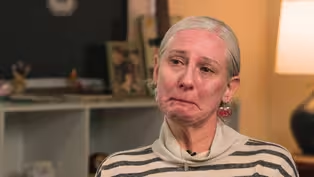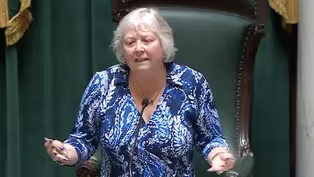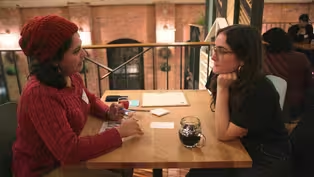
Feeling Lost
Clip: Season 6 Episode 18 | 8m 56sVideo has Closed Captions
In-depth report on the mental health issues that many of the State’s young people struggle with.
Students open up about their mental health struggles and area professionals weigh in on what needs to be done to help those in the midst of a crisis.
Problems playing video? | Closed Captioning Feedback
Problems playing video? | Closed Captioning Feedback
Rhode Island PBS Weekly is a local public television program presented by Ocean State Media

Feeling Lost
Clip: Season 6 Episode 18 | 8m 56sVideo has Closed Captions
Students open up about their mental health struggles and area professionals weigh in on what needs to be done to help those in the midst of a crisis.
Problems playing video? | Closed Captioning Feedback
How to Watch Rhode Island PBS Weekly
Rhode Island PBS Weekly is available to stream on pbs.org and the free PBS App, available on iPhone, Apple TV, Android TV, Android smartphones, Amazon Fire TV, Amazon Fire Tablet, Roku, Samsung Smart TV, and Vizio.
Providing Support for PBS.org
Learn Moreabout PBS online sponsorshippandemic kind of made my academic skills go down, and I felt, like, really lost in a sense.
I didn't really know how to socialize again.
- [Michelle] 17-year-old Arianna Bouzi is a high school senior in Providence.
She says her mental health was in a dark place last year.
- When I went to the school, I had, like, really bad anxiety.
I did open up to people in sophomore year, but then it went down again during junior year.
I started not going to school.
- You would skip school because you were feeling anxious?
- Yeah, I would skip school, it was like a whole, like, cycle.
So, like, I would not go to school, then feel bad for not going to school.
- Bouzi says she missed about half of her junior year because of her mental health.
She believes most of it had to do with struggling to socialize after learning remotely during the pandemic.
On the worst of days, what was that anxiety feeling like in your body?
- It's like your body is, like, all, like, tense.
Like, you feel really tense all the time.
And you feel like everything is gonna, like, happen, like, everything wrong is gonna happen to you, so you don't wanna step outside.
- [Michelle] Bouzi's experience is shared by many others.
A report by Rhode Island KIDS COUNT found young people are in a mental health crisis both nationally and in Rhode Island.
- We had seen increased rates of anxiety and depression prior to the pandemic, but then when the pandemic hit and young people were at home or away from their peers, were not able to be learning in school, it got worse.
- [Michelle] Stephanie Geller is the deputy director at Rhode Island KIDS COUNT.
She wrote the report, which describes how mental health issues are at higher rates among Black, Indigenous, and other people of color and lesbian, gay, bisexual, transgender, and queer youth.
- One of the things that they talk about is racism that they experience in their community, racism they experience online.
Members of the LGBTQ+ community talk about lack of acceptance and isolation in their own families when their parents don't accept them as well as how they feel in their schools and community and the way that they're received or what they see online in terms of negative comments about their identities.
- [Michelle] Geller analyzed data collected from the Youth Risk Behavior Survey, which is distributed to high school students nationwide every two years.
It found that in 2023, 9% of Rhode Island high school students reported attempting suicide one or more times during the past year.
Black and Hispanic or Latino teens consistently have higher rates of suicide attempts than White teens.
- I think that it really shows the struggles that young people are facing, the lack of confidence in themselves, the lack of acceptance they're feeling, the lack of support they're feeling.
And this anxiety and depression that we are seeing is translating, unfortunately, to action.
- It's terrifying to, like, think about the average experience of young people.
- Marco Lima is a sophomore at Brown University.
He helped lead focus groups with high school students from two youth development organizations, Young Voices and Youth Pride Inc. Those experiences were included in the Rhode Island KIDS COUNT report to help understand the issues facing young people in the state.
What was the most difficult thing that you heard a student share?
- Having those feelings that you know something's wrong, and then you can't really go to anyone about them, or at least not a professional about them.
And I think another one was just the not accepting, or their family didn't accept them fully for their queer identity.
- [Michelle] Lima describes himself as a gay man who's Latino and Indigenous.
He remembers how difficult it was to watch the news during the pandemic.
- Seeing how much police violence was out there and, like, the negative comments around queer people but then also people of color.
And at this point, I wasn't really out to my family, so it was all, like, an internal battle where I'm just, like, fighting these causes and, like, explaining to my family why it's important.
- [Michelle] Lima recalls feeling anxious and depressed during the pandemic but says he did not seek professional help.
- I didn't mostly because I didn't know where to go.
At this time, like, our insurance wasn't the best either.
So it was really a challenge, 'cause when I would talk to my mom about it, she would just say the truth, of like, "We don't have the money for that."
And then in my school, I just didn't know where to get that help.
And once again, we're on Zoom, so there's no office to go to.
- [Michelle] Julio Sabater is a licensed clinical psychologist in Pawtucket.
He's not surprised that young people in marginalized communities are reporting higher rates of mental health issues.
- You already have PTSD, you have trauma, and then you have your networks are maybe small, right?
You don't have a lot of connections.
And then when the pandemic hit, again, that intensified it, - [Michelle] But Sabater and Geller say the situation is not hopeless.
One of the solutions Geller writes about in the report is the need for funding to increase the number of mental health professionals in schools.
- When we talk to young people about any policy they want to see passed, this is their number one ask.
They've been working, a number of the organizations have been involved in a campaign called Counselors Not Cops, which is around trying to get school resource officer out of school and use that funding to replace them with mental health providers.
- Another recommendation, recruit and retain more diverse mental health providers.
Do you hear from people who seek you out specifically because you are a Latino man and they want someone who speaks their language, who looks like them, reminds them of a relative they have?
- Yes, absolutely, all the time.
It's about connection.
But particularly for our people, the Latinos and the BIPOC community, it's been proven that that's what helps in therapy.
One of the top indicators that therapy works and is successful is because you have someone in front of you that you could tell them, it's like you don't have to explain two or three times, you know, 'cause we get it.
- [Michelle] Arianna Bouzi, who identifies as bisexual and Haitian, says she once tried to get help at school when she was having a panic attack.
When she went looking for a guidance counselor, she was told there was no counselor available and felt dismissed by an administrator who told her to go back to class.
- Once I'm 18, I am gonna go get a therapist, talk to a therapist, like, routinely, but right now I can't 'cause obviously my parents have to do it.
- [Michelle] She says her mother is not supportive of her going to therapy.
- She thinks I have to talk to her.
When I talk to her, she just, like, blows up on me and she doesn't really get, like, how I'm feeling.
So that's why I really wanna talk to a therapist, but she doesn't really support that.
- [Michelle] As for Lima, he says his mental health has improved and he's better able to manage his emotions.
- If I'm having a bad week and everything's going wrong, I'll sit with myself and, like, really kind of go through each problem I'm having and try to unpack it a little bit and just, like, really work through why I'm feeling the ways I do with that problem.
- [Michelle] Both Lima and Bouzi credit afterschool programs like Young Voices with having a positive effect on their emotional wellbeing.
- I've surrounded myself with, like, people like me.
I have way more, like, support.
Like, I could go to anybody, talk about anything, and I just really love it here.
- [Michelle] Lima says it's important that young people ask for help when they need it, even if that help comes from outside of their family.
- Once again, like, you're not alone in this.
So many youth are going through this, and we're just all not willing to share, but we should be.
Video has Closed Captions
Clip: S6 Ep18 | 11m 14s | How technology is designed to be addictive. (11m 14s)
Video has Closed Captions
Clip: S6 Ep18 | 5m 50s | The Rhode Island Senate elects Valarie Lawson as its next president. (5m 50s)
Video has Closed Captions
Clip: S6 Ep18 | 6m 29s | In-depth report on loneliness and its devastating effects. (6m 29s)
Providing Support for PBS.org
Learn Moreabout PBS online sponsorship
- News and Public Affairs

Top journalists deliver compelling original analysis of the hour's headlines.

- News and Public Affairs

FRONTLINE is investigative journalism that questions, explains and changes our world.












Support for PBS provided by:
Rhode Island PBS Weekly is a local public television program presented by Ocean State Media


